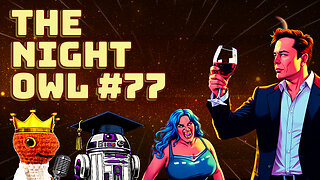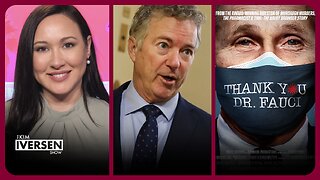Premium Only Content

COVID-19 Vaccine | Do I need to inject it for my pets? | Pet Tips
00:00 Do I need to inject the COVID-19 vaccine for my pets?
01:30 The symptoms of pets infected with the COVID-19 virus seem to be relatively mild
03:20 The COVID-19 animal vaccine is relatively easy to manufacture
Since the COVID-19 pandemic, it has had a huge impact on human society, and it has also infected pets, domestic animals, and wild animals, in this situation, Do I need to inject the COVID-19 vaccine for my pets? For example, cats and dogs may be infected by COVID-19. Cats also can spread COVID-19 to other cats. In the severe mink disaster areas of the world, epidemics broke out in animal and mink farms, which also caused human infections in Europe, and swamp farms had to be culled. Scientists also worry that humans or domestic animals may spread the virus to wildlife, resulting in an uncontrollable virus reservoir. Now, several human COVID-19 vaccines around the world have succeeded. But are vaccines for pets and other animals needed? How will they develop? And will they be useful soon? Also on December 18th, the “Science” magazine discussed this issue. "Science" reported that there is no need to use pet vaccines urgently. The symptoms of pets infected with the COVID-19 virus seem to be relatively mild, and it seems that cats and dogs do not play an important role in the spread of the COVID-19 virus. Commercial licenses for pet vaccines in the United States are approved by the United States Department of Agriculture. The U.S. Department of Agriculture has not yet approved any COVID-19 vaccine. The agency stated that "the data shows that this vaccine is of no value." US Department of Agriculture spokesperson Joelle Hayden told Science: “Companies are still free to develop these vaccines, but without a license, these companies cannot sell or distribute them.” Laboratory studies have shown that, from the perspective of cell receptors, SARS-CoV-2 can infect a variety of animals, from squirrels to sheep and even sperm whales. EcoHealth vice president of science and promotion Jonathan Epstein said in an interview with "Science" that it is most concerned about gorillas. Epstein said that human respiratory viruses were deadly in chimpanzees and gorillas in the past. Researchers worry that COVID-19 may eliminate endangered primate species in Africa and Asia. Black-footed ferrets and other endangered animals are also attracting attention. Given that ferrets in the laboratory are highly susceptible to the COVID-19 virus, the risk of COVID-19 outbreaks in black-footed ferrets is high. Epstein also worried about mink. He said that because of the outbreak of the COVID-19 epidemic in mink farms, the virus may mutate and spread not only to people but also to wild animals. Epstein believes that for minks and apes, the best way to protect them is to change the way we interact with them. For example, the density of mink farming is very high, which is likely to promote the spread of the virus. Epstein said that regardless of whether people have been vaccinated against COVID-19, they should take additional precautions against animals that may be infected with COVID-19. For example, people who want to come into contact with gorillas should wear masks. However, the COVID-19 animal vaccine is relatively easy to manufacture. Russia recently announced that it will complete clinical trials of the COVID-19 vaccine for domestic animals and pets such as mink and cats. Zoetis, a US veterinary pharmaceutical company, is also studying vaccines for mink and pets. The latest data provided by the company shows that cats and dogs have a strong immune response to viral molecules or antigens, although it is not clear whether it is sufficient to protect them from infection.
-Pet Tips
-
 LIVE
LIVE
Price of Reason
8 hours agoElon Musk TARGETED By Hollywood & MSM! Yellowstone DISAPPOINTS! Dragon Age Veilgard DISASTER!
1,804 watching -
 LIVE
LIVE
Akademiks
3 hours agoLil Durk Pleads NOT GUILTY and Hires NBA Youngboy Lawyer To Represent him! Lil Baby tryna comeback?
5,999 watching -
 3:27:19
3:27:19
SNEAKO
5 hours agoSNEAKO X JACE!
44.9K5 -
 57:42
57:42
The Charlie Kirk Show
5 hours agoTHOUGHTCRIME: Clash of the Cabinet Edition
105K26 -
 1:04:59
1:04:59
Man in America
8 hours agoThe Dark Truth Behind Sunscreen, Cancer, Pharmakeia & Doctor Worship w/ Jonathan Otto
22.9K6 -
 49:35
49:35
PMG
1 day ago $0.52 earned'Ukraine and the Giant Distraction!"
7.16K2 -
 1:32:50
1:32:50
Kim Iversen
6 hours agoSHOCKING: New Evidence That Fauci Lied, People Died | Thank You, Dr. Fauci
82.2K67 -
 1:31:04
1:31:04
Glenn Greenwald
7 hours agoBiden Admin Pledges Every Last Penny To Ukraine; Russia Hysteria Explodes After Tulsi Nomination; Biden's Fraudulent Israel Ultimatum | SYSTEM UPDATE #366
105K92 -
 1:31:25
1:31:25
Precision Rifle Network
11 hours agoS3E7 Guns & Grub with special guest Benchrest Marksman
24.2K -
 2:13:21
2:13:21
tacetmort3m
9 hours ago🔴 LIVE - BUG ONLY STREAM (SOLO OR MAYBE TEAM?) - HELLDIVERS 2
17.3K4